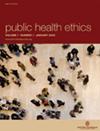Smokers’ Regrets and the Case for Public Health Paternalism
IF 2
3区 哲学
Q2 ETHICS
引用次数: 1
Abstract
Paternalist policies in public health often aim to improve people’s well-being by reducing their options, regulating smoking offering a prime example. The well-being challenge is to show that people really are better off for having their options reduced. The distribution challenge is to show how the policies are justified since they produce losers as well as winners. If we start from these challenges, we can understand the importance of the empirical evidence that a very high proportion of smokers regret smoking. In short, it is important that they regret it and important that the proportion is so high. This paper explains how, philosophically, regret can relate to well-being and it considers some of the strengths and weakness in the empirical research that the explanation brings out. The regret case for regulating smoking is indeed strong, although not as strong as the empirical researchers think. It is much weaker for paternalistic intervention in other public health problems, such as obesity and binge drinking.吸烟者的遗憾和公共卫生家长主义的案例
公共卫生领域的家长式政策往往旨在通过减少人们的选择来改善人们的福祉,管制吸烟就是一个最好的例子。幸福的挑战是要证明人们在减少选择后确实过得更好。分配方面的挑战在于,如何证明这些政策是合理的,因为它们既产生了赢家,也产生了输家。如果我们从这些挑战开始,我们就能理解经验证据的重要性,即非常高比例的吸烟者后悔吸烟。简而言之,重要的是他们后悔,重要的是比例如此之高。本文从哲学上解释了后悔如何与幸福相关,并考虑了实证研究中解释所带来的一些优势和弱点。管制吸烟的遗憾理由确实很充分,尽管没有实证研究人员认为的那么充分。对于其他公共健康问题,如肥胖和酗酒,家长式干预的效果要弱得多。
本文章由计算机程序翻译,如有差异,请以英文原文为准。
求助全文
约1分钟内获得全文
求助全文
来源期刊

Public Health Ethics
PUBLIC, ENVIRONMENTAL & OCCUPATIONAL HEALTH-MEDICAL ETHICS
CiteScore
3.10
自引率
9.50%
发文量
28
审稿时长
>12 weeks
期刊介绍:
Public Health Ethics invites submission of papers on any topic that is relevant for ethical reflection about public health practice and theory. Our aim is to publish readable papers of high scientific quality which will stimulate debate and discussion about ethical issues relating to all aspects of public health. Our main criteria for grading manuscripts include originality and potential impact, quality of philosophical analysis, and relevance to debates in public health ethics and practice. Manuscripts are accepted for publication on the understanding that they have been submitted solely to Public Health Ethics and that they have not been previously published either in whole or in part. Authors may not submit papers that are under consideration for publication elsewhere, and, if an author decides to offer a submitted paper to another journal, the paper must be withdrawn from Public Health Ethics before the new submission is made.
The editorial office will make every effort to deal with submissions to the journal as quickly as possible. All papers will be acknowledged on receipt by email and will receive preliminary editorial review within 2 weeks. Papers of high interest will be sent out for external review. Authors will normally be notified of acceptance, rejection, or need for revision within 8 weeks of submission. Contributors will be provided with electronic access to their proof via email; corrections should be returned within 48 hours.
 求助内容:
求助内容: 应助结果提醒方式:
应助结果提醒方式:


